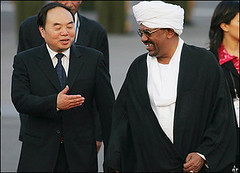
Sudanese President Omar al-Bashir Being Greeted By Chinese Official After Arriving in Beijing for the Sino-African Summit
Originally uploaded by Pan-African News Wire Photo File
Thu Jan 28, 2010 1:00pm GMT
KHARTOUM (Reuters) - Sudan expects to sign a final deal with China's CNPC in 2010 to expand its Khartoum oil refinery by 50,000 barrels per day within three years to meet growing local demand, a senior official said on Thursday.
A further 50,000 bpd expansion would then be considered to double the refinery's current 100,000 bpd capacity. Plans to build a refinery for exports in Port Sudan are frozen after Malaysia's Petronas withdrew its financing, said Omer Mohamed Kheir, secretary-general of Sudan's energy ministry.
"We need this (expansion) for consumption which is growing," Kheir told Reuters on the sidelines of a conference in Khartoum.
He added Sudan expected to finalise details with state-owned China National Petroleum Corporation (CNPC) including costs before signing a final deal this year.
Kheir said Cairo had given an initial okay to export gas to Sudan, but they were waiting to see how much its northern neighbour could spare because of Egypt's booming domestic needs.
"We have not sat down and worked on the details yet."
Kheir said drilling was continuing for natural gas in the Red Sea off Sudan's coast and he expected significant finds once drilling broke through the pre-salt layer.
"Gas was discovered there in the 1970s," he said.
Sudan produces just under 500,000 bpd of crude but hopes to rapidly increase output in the next few years with new discoveries and better technologies to extract the oil
Sudan's Nile Blend is a sweet crude, easily refined but the other Dar Blend is heavier, difficult to move and sells at a discount.
Much of Sudan's oil lies along its still disputed north-south border. A 2005 peace deal ended 22 years of civil war, but gave the south a vote on secession in January 2011. Most analysts believe the south will separate, reducing the crude available to the north.
But with oil infrastructure entirely in the north and the semi-autonomous southern government deriving more than 95 percent of its revenue from oil, some believe any separation would have to be amicable.
Kheir said Sudan was hoping to develop nuclear energy for civilian use, and was working closely with the International Atomic Energy Agency (IAEA) to achieve this goal.
"This is an international right of any country now," he said. "We are still at the beginning."
He said it would take any nation at least 10 years to be able to produce atomic energy.
President Omar Hassan al-Bashir has previously said Sudan was hoping to build a nuclear plant to help meet booming electricity needs in the country of 40 million, devastated by decades of multiple civil wars.
No comments:
Post a Comment